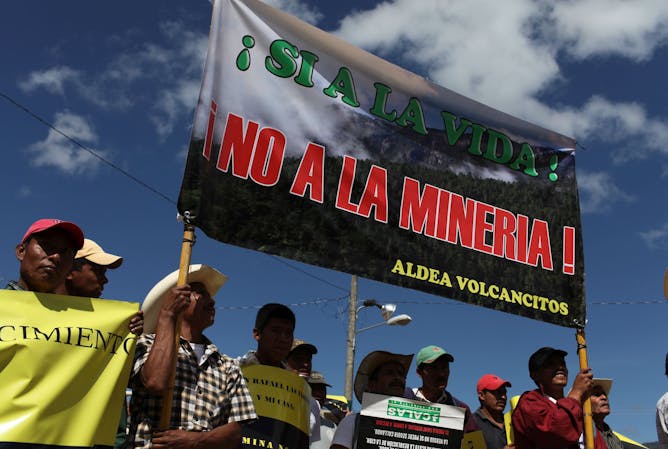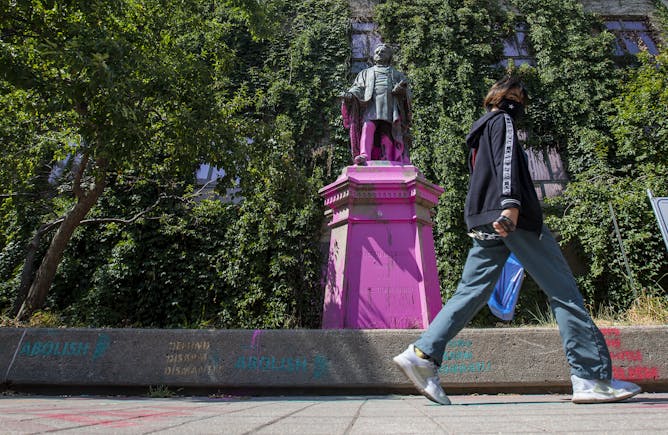|
The sometimes appalling conduct of Canadian mining companies abroad is a woefully under-reported story. There’s even a dearth of images in Canadian photo archives to accompany stories about egregious human rights violations at Canadian-owned and operated mines around the world — a sign that Canada’s news organizations have largely failed to report on some truly shocking allegations and developments.
Nonetheless, investors are increasingly taking notice. Today in The Conversation Canada, Shin Imai at York University’s Osgoode Hall Law School and Sarah Colgrove, an adjunct law professor at Ryerson University, explain how investors are shunning mining companies that routinely fail to consult with the Indigenous communities where their mines are operating or openly violate human rights. In short, human rights violations and failures to consult Indigenous communities dramatically affect share prices.
They write: “A growing body of research suggests that investors care about human rights impacts and consultation with Indigenous communities, and consider them important to the value of their investments.”
Also today:
|

Guatemalans protest against the Escobal mine in Guatemala in 2012.
(James A. Rodríguez/MiMundo.org)
Shin Imai, York University, Canada; Sarah Colgrove, Ryerson University
A growing body of research suggests that investors care about human rights and consultation with Indigenous communities, and consider them important to the value of their investments.
|

Indigenous people with experience guiding culturally safe talking circles in an online environment can work with students to nurture safe virtual spaces.
(Shutterstock)
Josephine Auger, Athabasca University; Janelle Marie Baker, Athabasca University
Student respondents to a survey discussed memories of historical trauma of infectious disease and displacement, financial hardship related to Alberta tuition hikes and mental health concerns.
|

Facebook blocked Australians from sharing news stories, escalating a fight with the government over whether powerful tech companies should have to pay news organizations for content.
(AP Photo/Rick Rycroft)
Jean-Hugues Roy, Université du Québec à Montréal (UQAM)
Facebook recently removed Australian news stories from its site. If Ottawa follows Australia's lead, Facebook might do the same in Canada.
|

Black Lives Matter protesters threw pink paint on a statue of Egerton Ryerson at Ryerson University in Toronto on July 18, 2020.
THE CANADIAN PRESS/Carlos Osorio
Hunter Knight, University of Toronto
Let's not ignore how the racist philosophy behind residential schools shaped mainstream education. Ryerson foresaw Canada's continuing evolution into a "civilized," white, culturally British nation.
|

Giving new dads ‘fathers-only’ leave is one way to support women’s equality.
Catherine Delahaye/Stone via Getty Images
Ivona Hideg, York University, Canada; Manuela Priesemuth, Villanova University
Women and their careers benefit when men are allowed – and encouraged – by their employers to do more caregiving.
|
Science + Technology
|
-
Jacob Job, Colorado State University
Arctic foxes have a few special talents that help them sneak up on unseen prey and pounce.
|
|
Health
|
-
Iain McPhee, University of the West of Scotland
Scotland has recently experienced a dramatic increase in drug-related deaths among its poorest. Now new research has translated directly into policy change.
|
|
COVID-19
|
-
Hassan Vally, La Trobe University
Surface transmission is a very uncommon way of getting COVID. We should focus most of our attention on the airborne route, potentially saving millions of dollars on obsessive cleaning practices.
|
|